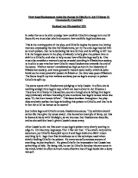Essay-Compare the ways in which Shakespeare show’s protagonists changing in Act III Scene III of ‘Othello’ and Act I Scene VII of ‘Macbeth
In this essay I will be discussing how the two protagonists; ‘Macbeth’ and ‘Othello’ change throughout the plays. Our First impressions of ‘Othello’ and ‘Macbeth’ are very similar; they are both Brave warriors who would give up their lives to save their people. Macbeth a very courageous, brave warrior who is exceedingly close to the king, and Othello labelled by his people as “brave”, “Valiant” and fearless, he was a very well respected man. Both these two change into heartless, ferocious murders that kill innocent lives for their own good. The change between these two is hugely significant after their tragic flaws takeover their lives. Macbeths being ‘Ambition’ and Othello’s being ‘Jealousy.’ Act I Scene VII of ‘Macbeth’ and Act III Scene III of ‘Othello’ are the key scenes in each play in which both protagonists change dramatically. Macbeth in less than 5 minutes and Othello in 20, both are shown changing from good to evil by Shakespeare.
The way in which Othello is shown changing in Act III Scene III by Shakespeare. At the beginning of Act III Scene III of ‘Othello’, it starts off with Cassio asking Desdemona to speak to Othello about giving him his rank as lieutenant back, and as Cassio exits Iago in the company Othello draws attention to Cassio leaving Desdemona by saying ‘Ha’ which immediately casts a doubt upon Othello’s mind and he follows that up by saying “Ha I like not that” which makes Othello think that bit extra about Cassio and Desdemona, However despite the early effort of that Shakespeare uses a metaphor in which Othello shows his love for Desdemona by labelling her as ‘excellent wretch’ and Othello’s enthusiasm about his love for Desdemona shows the audience that Othello hasn’t yet changed. Sometime later in the scene Iago asks Othello if Cassio knew that Othello was in love with Desdemona when Othello was wooing her. Othello confirms that he did, and Iago suddenly begins to talk about reputation by relating reputation as a jewel saying it is of high value;”...dear my lord, is the immediate jewel of their souls”, he the follows by talking about jealousy and labels it as ‘the green eyed monster’; he also reiterates what it is like to be cuckold which shows the audience that Iago keeps putting thoughts in Othello’s mind and Othello is obviously think about it when he replies firmly by demanding proof-“No, Iago; I’ll see before I doubt; when I doubt, prove” and he decides not to talk further of the topic arisen by Iago. Shakespeare late uses dramatic Irony to make the audience feel sympathy. He replies to Iagos apology “I am bound to thee for ever,” this is closely followed by significance as there is a use of repetition by Iago when he again arises the topic “hath dash’d your spirits... but I do see you’re moved...I see you are moved.” At this point in the play for the first time Othello voices a fear that it is unnatural for a white women to fall in love with a black man. Moving on, Othello begins to believe in Iago confidently and this is proven when he says the following-“Why did I marry? This honest creature (referring to Iago) doubtless sees and knows more, much more, than he unfolds.” This comes to the audience as a shock because he doesn’t question Iago and trusts him more than his love. He shows that he trusts him more than his love when he says “why did I marry” this is a very strong line as it shows the first signs of Othello changing. Soon after this audience come to acknowledge of how evil and crafty Iago is, this is when he is telling the audience of his plan and he uses phrases such as : Moor, Poison, holy writs etc, this indicates once again by the choice of words that Iago is choosing to say, it clearly demonstrates to the audience of his wickedness. Then later in the scene comes the most dangerous point for Iago. Othello insists of proof of Desdemona’s infidelity or he will so something terrible to Iago. This gives the audience great hope that Othello still very much believes in his love however Iago’s response is quick and he acts as though he is deeply hurt by this, which makes Othello calm down and think again. Right at the end of the scene in my opinion is the most significant line said by Othello which shows that he has completely changed and Iago has succeeded, it is shown when Othello is going mad and wants to tear her to pieces-“I’ll tear her to pieces.” This point onwards all that Othello talks about is murder and death which now shows the audience that he has completely change when he says that he wishes that Cassio had 40,000 lives so he can kill him 40,000 times. At the end of the play, again it is demonstrated of his change when in Act V Scene II he labels Desdemona as a ‘whore’ and ‘like a liar gone to burning hell.’








